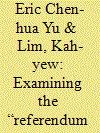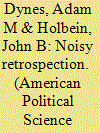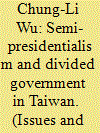|
|
|
Sort Order |
|
|
|
Items / Page
|
|
|
|
|
|
|
| Srl | Item |
| 1 |
ID:
181916


|
|
|
|
|
| Summary/Abstract |
While foreign pundits have alternatively blamed and praised the Chinese government’s handling of the COVID-19 virus, little is known about how citizens within China understand this performance. This article considers how satisfied Chinese citizens are with their government’s performance during the COVID-19 pandemic. It first considers the impact of authoritarian control, political culture, and/or actual government performance on citizen satisfaction. Then, it tests the consequences of satisfaction and specifically whether citizen satisfaction leads to greater trust. Analyzing data from the first post-COVID survey of its kind (n = 19,816) conducted from April 22 to 28 April 2020, the authors find that Chinese citizens have an overall high level of satisfaction, but that this satisfaction drops with each lower level of government. Further, authoritarian control, political culture, and awareness of government performance all contribute to citizen satisfaction and this in turn, has enhanced public support for the Chinese government.
|
|
|
|
|
|
|
|
|
|
|
|
|
|
|
|
| 2 |
ID:
180697


|
|
|
|
|
| Summary/Abstract |
This paper analyzes the extent to which the performances of local and national governments can shape local election outcomes. Specifically, we use various waves of survey data from Taiwan’s Elections and Democratization Studies (TEDS) to explore whether a person’s assessments of local and central government performances affect his/her vote for the incumbent party candidate. Our empirical findings partially verify the so-called “referendum theory” and can be summarized as follows: First, voters who hold a positive assessment of the performance of local government are more likely to vote for an incumbent who seeks reelection, but this is not necessarily the case for an incumbent party candidate in an open-seat contest. Second, Taiwan’s local elections cannot be regarded as referenda on the central government because the central government approval rating does not consistently affect vote choices across different types/levels of local elections.
|
|
|
|
|
|
|
|
|
|
|
|
|
|
|
|
| 3 |
ID:
171345


|
|
|
|
|
| Summary/Abstract |
Retrospective voting is vital for democracy. But, are the objective performance metrics widely thought to be relevant for retrospection—such as the performance of the economy, criminal justice system, and schools, to name a few—valid criteria for evaluating government performance? That is, do political coalitions actually have the power to influence the performance metrics used for retrospection on the timeline introduced by elections? Using difference-in-difference and regression discontinuity techniques, we find that US states governed by Democrats and those by Republicans perform equally well on economic, education, crime, family, social, environmental, and health outcomes on the timeline introduced by elections (2–4 years downstream). Our results suggest that voters may struggle to truly hold government coalitions accountable, as objective performance metrics appear to be largely out of the immediate control of political coalitions.
|
|
|
|
|
|
|
|
|
|
|
|
|
|
|
|
| 4 |
ID:
158031


|
|
|
|
|
| Summary/Abstract |
This article examines the role of participatory governance innovations in China. The purpose is twofold. First, it seeks to explore the logic and dynamics behind participatory innovations in China. Second, it examines in what way a participatory innovation in Hangzhou can lead to increased accountability and responsiveness of the local government. Participatory innovations in China are used as a way to improve the Party-state’s governing capability and thereby strengthen the legitimacy and power of the Communist Party. Despite some limitations related to the evaluation of politically powerful Party and government departments, social assessment of government performance in Hangzhou serves as an input channel from society that put pressure on many government departments. The study finds that by allowing limited and controlled political participation, transparency and accountability to develop, the reform in Hangzhou improves the responsiveness of the political system.
|
|
|
|
|
|
|
|
|
|
|
|
|
|
|
|
| 5 |
ID:
100973


|
|
|
| 6 |
ID:
113201


|
|
|
|
|
| Publication |
2012.
|
| Summary/Abstract |
In 2004 and 2009, the incumbent central governments in India enjoyed a high level of voter satisfaction. Why then did incumbents lose elections in 2004, while winning them in 2009? The different electoral outcomes can be explained by a combination of satisfaction with a constituent's member of Parliament and the performance of the government at the state level, as well as satisfaction with the government at the national level. This analysis rejects the conventional argument of general satisfaction with the performance of the central government as being the determinant of electoral outcomes in national elections.
|
|
|
|
|
|
|
|
|
|
|
|
|
|
|
|
|
|
|
|
|